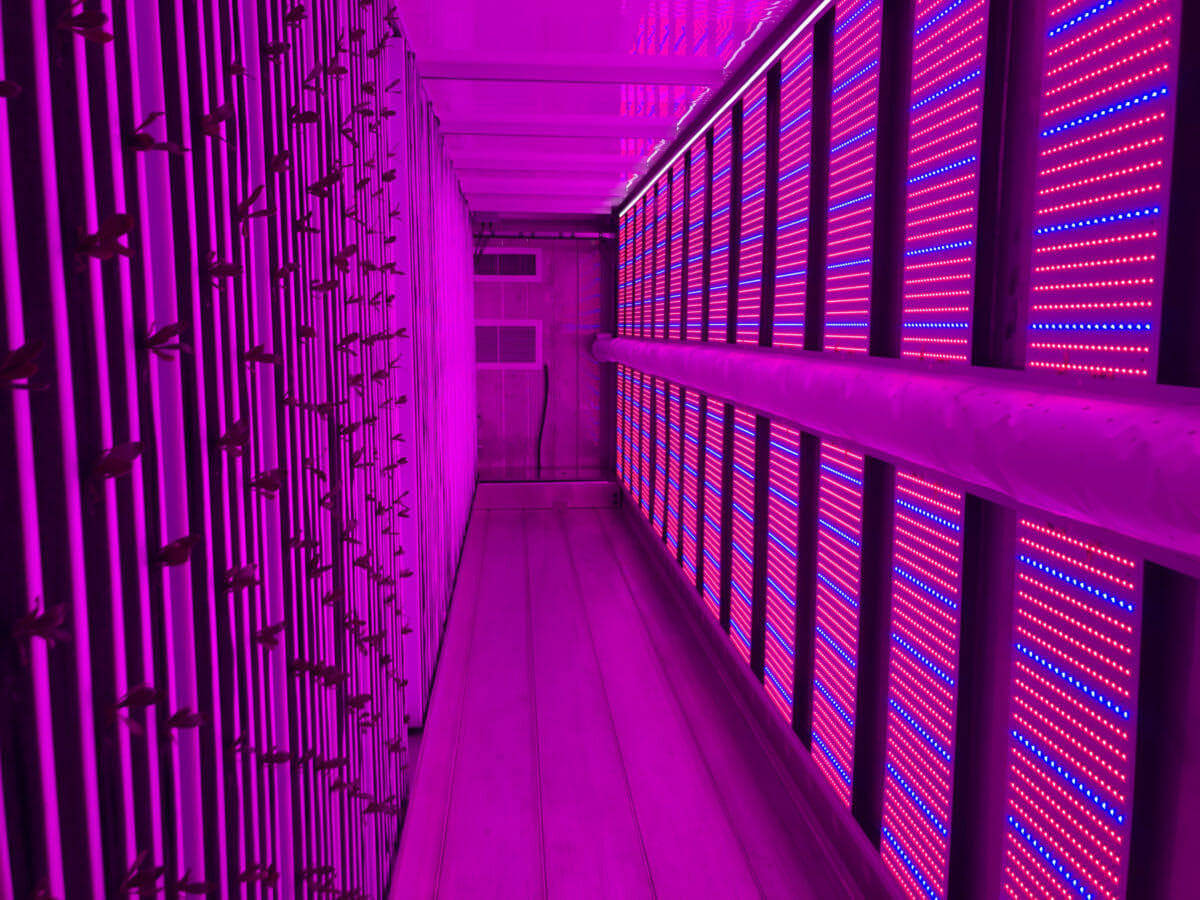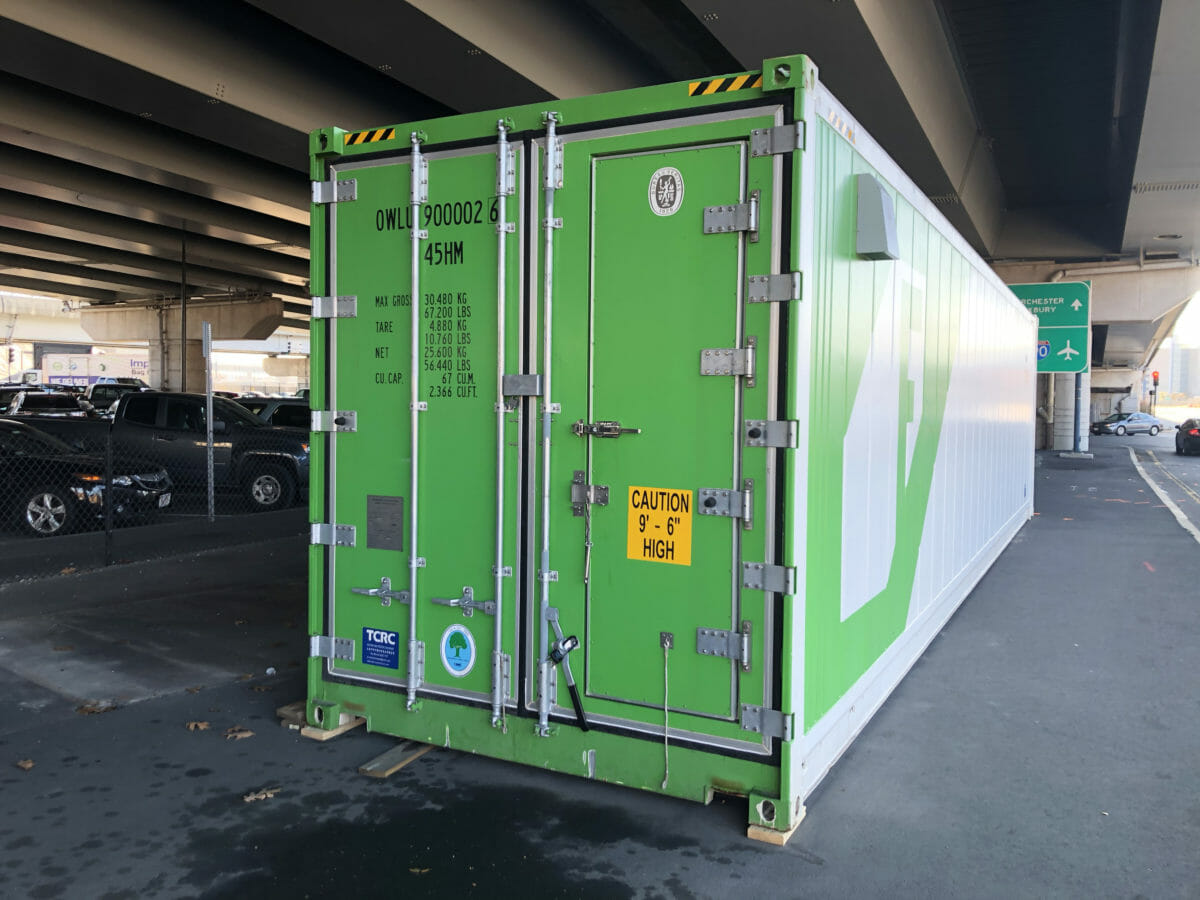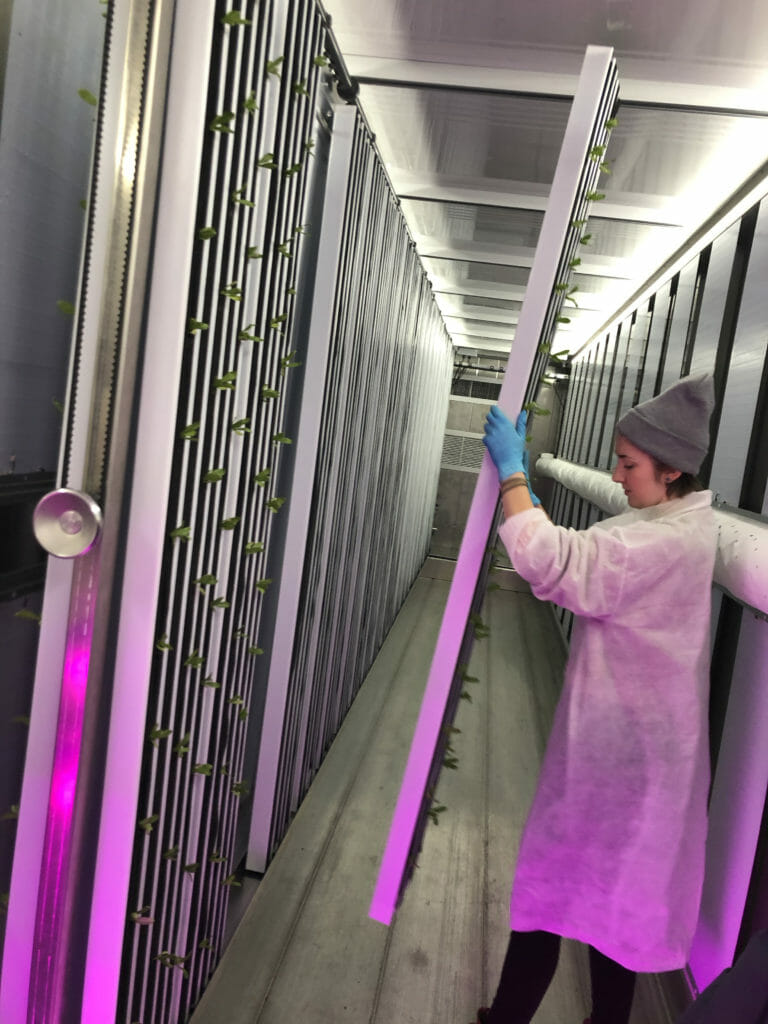Freight Farms Takes Container Growing to the Next Level
This Boston company has opened its new ‘Greenery’ below an overpass.
Freight Farms Takes Container Growing to the Next Level
This Boston company has opened its new ‘Greenery’ below an overpass.

Freight Farms current model sells for $104,000.by Andrew Amelinckx
From the outside, it resembles any one of the 17 million shipping containers that are currently in use around the world. But step inside and you’re entering a futuristic hydroponic, vertical farm where cutting-edge technology can grow anything from tomatoes to turnips. It’s called the “Greenery” and it’s the newest container farm from Freight Farms, the company that has pioneered this unique style of indoor growing starting in 2010.
I recently toured a Greenery located below an overpass on I-93 in Boston’s South End neighborhood, a few blocks from Freight Farm’s headquarters, with Brad McNamara and Jon Friedman, the company’s founders. The placement of the container farm wasn’t accidental. They can be sent anywhere in the world a regular shipping container can go and used in a myriad of settings, from an urban underpass in Boston to the jungles of Vietnam, or the Google campus in Mountainview, California.

The Greenery can pack the equivalent of 3.5 acres worth of produce (13,000 plants) into a 320-square-foot space and it uses less than five gallons of water a day. That’s 99.8 percent less water than a traditional soil-based farm, according to Friedman. Farmers can tailor fit the Greenery’s growing conditions via its unique operating system to influence the flavor, color, texture, and size of crops. The company has standardized “recipes” that can be uploaded to an operating system that controls exact combinations of nutrient and CO2 levels, as well as light and water schedules. The operating system controls everything from the components and sensors to the climate and temperature, and then it continuously relays the information to a smartphone application called the Farmhand App that the farmer can also use to remotely run the farm.
The Greenery is the second-generation container farm from the company and is replacing its original model called the Leafy Green Machine.
“Inevitably, as the network of farmers grew, farmers are farmers—they’re entrepreneurial—and we wanted to encourage experimentation,” McNamara says. “That’s where a lot of the development with the Greenery came in. Light spectrum, spacing, and the biology of the plant were the limiting factors and that’s what pushed the Greenery’s development.”
The company did a complete redesign of the Leafy Green Machine, from the body to every part of the interior. Where the old model used reconditioned shipping containers, the Greenery’s shell has been custom designed, but it can still be transported like a regular shipping container. The new design has 70 percent more growing space in the same footprint. Lightweight growing panels can be maneuvered using a rack-and-pinion system that allows the farmer to customize the growing space to accommodate larger plants, improve workflow, or for hyper-specific growing conditions. A new HVAC system specifically designed for the Greenery condenses and recycles water in the air. In some humid areas, such as in Miami where one of the Greenerys has been installed, it can capture enough moisture (around 1.5 gallons of water per hour) to make the operation water positive.

The new interior includes a workstation used for seeding, transplanting, and harvesting. It has its own dedicated watering system that can dose two independently controlled seedling troughs with water and nutrients on different cycles along with its own LED lighting system.
“You can program them to grow differently,” Friedman says.
When I was there, one of the company’s farmers, Lexy Basquette, was in the process of transplanting calendula seedlings, commonly known as marigolds, from the workstation where the seedlings grew to the plant panels that hang on a mobile rack system where the plants will grow to maturity before harvesting. Basquette was in the process of testing out four different types of calendula for a skincare company as part of a new subscription service Freight Farms offers called Grown.
“Customers either have the farm onsite or remotely and we run it so that they don’t have to have the full scope of involvement but they can still see the benefits,” Friedman says.
The Greenery sells for $104,000 (it’s going up to $115,000 after the first of the year). The first run of 20 is already sold out and have been shipped to customers in the US, Canada, Spain, and the UK. There’s a waitlist for the next 60 that will be ready for delivery before the first half of 2020, Friedman says.
“We wanted to build something where farmers on different sides of the world can communicate on the same framework, which really doesn’t happen,” Friedman says. “The sense of community we’ve gotten just from standardizing something farmers can share has been very fulfilling.”
Follow us
This work is licensed under a Creative Commons Attribution-NoDerivatives 4.0 International License.
Want to republish a Modern Farmer story?
We are happy for Modern Farmer stories to be shared, and encourage you to republish our articles for your audience. When doing so, we ask that you follow these guidelines:
Please credit us and our writers
For the author byline, please use “Author Name, Modern Farmer.” At the top of our stories, if on the web, please include this text and link: “This story was originally published by Modern Farmer.”
Please make sure to include a link back to either our home page or the article URL.
At the bottom of the story, please include the following text:
“Modern Farmer is a nonprofit initiative dedicated to raising awareness and catalyzing action at the intersection of food, agriculture, and society. Read more at <link>Modern Farmer</link>.”
Use our widget
We’d like to be able to track our stories, so we ask that if you republish our content, you do so using our widget (located on the left hand side of the article). The HTML code has a built-in tracker that tells us the data and domain where the story was published, as well as view counts.
Check the image requirements
It’s your responsibility to confirm you're licensed to republish images in our articles. Some images, such as those from commercial providers, don't allow their images to be republished without permission or payment. Copyright terms are generally listed in the image caption and attribution. You are welcome to omit our images or substitute with your own. Charts and interactive graphics follow the same rules.
Don’t change too much. Or, ask us first.
Articles must be republished in their entirety. It’s okay to change references to time (“today” to “yesterday”) or location (“Iowa City, IA” to “here”). But please keep everything else the same.
If you feel strongly that a more material edit needs to be made, get in touch with us at [email protected]. We’re happy to discuss it with the original author, but we must have prior approval for changes before publication.
Special cases
Extracts. You may run the first few lines or paragraphs of the article and then say: “Read the full article at Modern Farmer” with a link back to the original article.
Quotes. You may quote authors provided you include a link back to the article URL.
Translations. These require writer approval. To inquire about translation of a Modern Farmer article, contact us at [email protected]
Signed consent / copyright release forms. These are not required, provided you are following these guidelines.
Print. Articles can be republished in print under these same rules, with the exception that you do not need to include the links.
Tag us
When sharing the story on social media, please tag us using the following: - Twitter (@ModFarm) - Facebook (@ModernFarmerMedia) - Instagram (@modfarm)
Use our content respectfully
Modern Farmer is a nonprofit and as such we share our content for free and in good faith in order to reach new audiences. Respectfully,
No selling ads against our stories. It’s okay to put our stories on pages with ads.
Don’t republish our material wholesale, or automatically; you need to select stories to be republished individually.
You have no rights to sell, license, syndicate, or otherwise represent yourself as the authorized owner of our material to any third parties. This means that you cannot actively publish or submit our work for syndication to third party platforms or apps like Apple News or Google News. We understand that publishers cannot fully control when certain third parties automatically summarize or crawl content from publishers’ own sites.
Keep in touch
We want to hear from you if you love Modern Farmer content, have a collaboration idea, or anything else to share. As a nonprofit outlet, we work in service of our community and are always open to comments, feedback, and ideas. Contact us at [email protected].by Andrew Amelinckx, Modern Farmer
December 9, 2019
Modern Farmer Weekly
Solutions Hub
Innovations, ideas and inspiration. Actionable solutions for a resilient food system.
ExploreExplore other topics
Share With Us
We want to hear from Modern Farmer readers who have thoughtful commentary, actionable solutions, or helpful ideas to share.
SubmitNecessary cookies are absolutely essential for the website to function properly. This category only includes cookies that ensures basic functionalities and security features of the website. These cookies do not store any personal information.
Any cookies that may not be particularly necessary for the website to function and are used specifically to collect user personal data via analytics, ads, other embedded contents are termed as non-necessary cookies.
Thats a well built 40 foot high cube refrigerated insulated container pictured in the article. The specs of having a man door installed within the container door is a brilliant space saving technique.